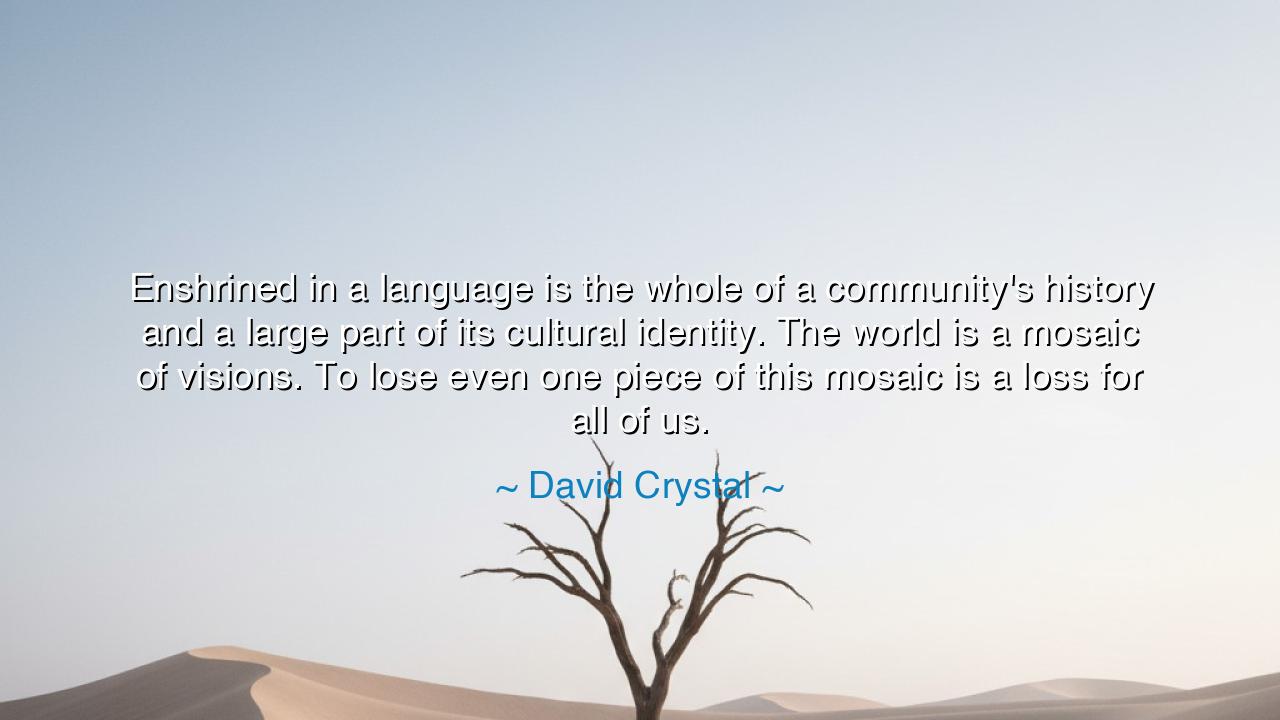
Enshrined in a language is the whole of a community's history and
Enshrined in a language is the whole of a community's history and a large part of its cultural identity. The world is a mosaic of visions. To lose even one piece of this mosaic is a loss for all of us.






When David Crystal, the great linguist and guardian of words, proclaimed, “Enshrined in a language is the whole of a community’s history and a large part of its cultural identity. The world is a mosaic of visions. To lose even one piece of this mosaic is a loss for all of us,” he was not speaking only of words and grammar, but of the soul of humanity. In these lines lies a truth as ancient as civilization itself — that language is not merely a tool for communication, but the sacred vessel of memory, thought, and spirit. Each language, from the smallest dialect to the grandest tongue of empires, carries within it the laughter, sorrow, wisdom, and dreams of generations. To lose one is to extinguish an entire world of meaning — a world that will never be born again.
The origin of this quote comes from Crystal’s lifelong study of linguistics and his passionate defense of endangered languages. As he traveled the world and listened to the voices of vanishing peoples, he saw that the death of a language is not a quiet event — it is a tragedy of silence, the fading of a culture’s heartbeat. When a language dies, a way of seeing the world dies with it: the proverbs that once guided the old, the songs that once comforted the young, the names of rivers and mountains whispered by ancestors — all vanish into dust. Crystal’s vision, then, is both a warning and a plea: to preserve language is to preserve humanity’s diversity of vision, to protect the mosaic of life from crumbling into sameness.
For every language is a universe. The words we speak are shaped by the landscapes we live in, the beliefs we hold, the stories we tell. The Inuit speak of snow in many shades because their survival depends upon knowing its every mood; the Maori sing of the land as a living ancestor; the Navajo describe time not as a line but as a circle, forever returning. In each case, language reveals not only how a people communicate, but how they think, feel, and exist. Crystal calls this the “mosaic of visions” — a grand design where each culture offers a different light, a different perspective, a different way of being human. To lose one piece of that mosaic is to darken the whole picture, to make the world less radiant, less wise.
History bears witness to this truth in both sorrow and hope. When the Gaelic language of Ireland and Scotland began to fade under centuries of conquest and suppression, it was not just words that were lost, but songs, poetry, and a way of seeing the hills and seas. The conquerors thought they were bringing progress; in truth, they were dimming a light of the world. Yet, even now, through the labor of a few devoted souls, the Gaelic tongue rises again — taught in schools, sung in festivals, and whispered between children. This resurrection reminds us that though languages can be wounded, they can also be healed, if only there is love enough to remember them.
Crystal’s wisdom, then, calls upon us to see language as a living treasure, not a relic to be studied, but a flame to be tended. Each tongue holds within it centuries of adaptation — ways of surviving, of loving, of worshipping, of belonging. When we let a language die, we do not only silence a people; we impoverish ourselves. For in a world that grows ever more connected, there is danger in uniformity — danger in thinking that one language, one way of thought, can speak for all humanity. The mosaic must remain varied, each piece shining with its own color, each voice contributing its melody to the great chorus of humankind.
The lesson is clear: we must listen, protect, and learn. Seek out the words of your elders before they fade. Honor the dialects of your village, the languages of your neighbors, the stories of your grandparents. Let no tongue be called “lesser” — for every word, whether sung in the deserts of Arabia or whispered in the forests of the Amazon, holds a fragment of human truth. As Crystal teaches, when we preserve a language, we are not saving a sound, but a vision of the world, a way of understanding life that no other tongue can replicate.
So, O listener of wisdom, take this truth into your heart: the world is a mosaic, and you are one of its pieces. Guard the languages around you as you would guard a sacred flame. Learn a word from another culture, read a poem in its native tongue, support those who strive to keep their speech alive. For when you do, you become a keeper of civilization’s soul. And remember always, as David Crystal reminds us — to lose even one piece of this mosaic is to lose something of ourselves, something irreplaceable, something divine.
For in the end, it is not armies or empires that define humanity, but its voices — the countless tongues that sing the story of who we are. And as long as those voices endure, the great mosaic of the world will shine with all its colors, bright and eternal, beneath the light of time.






AAdministratorAdministrator
Welcome, honored guests. Please leave a comment, we will respond soon